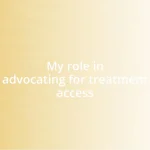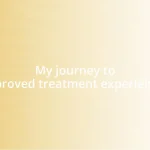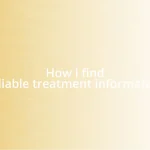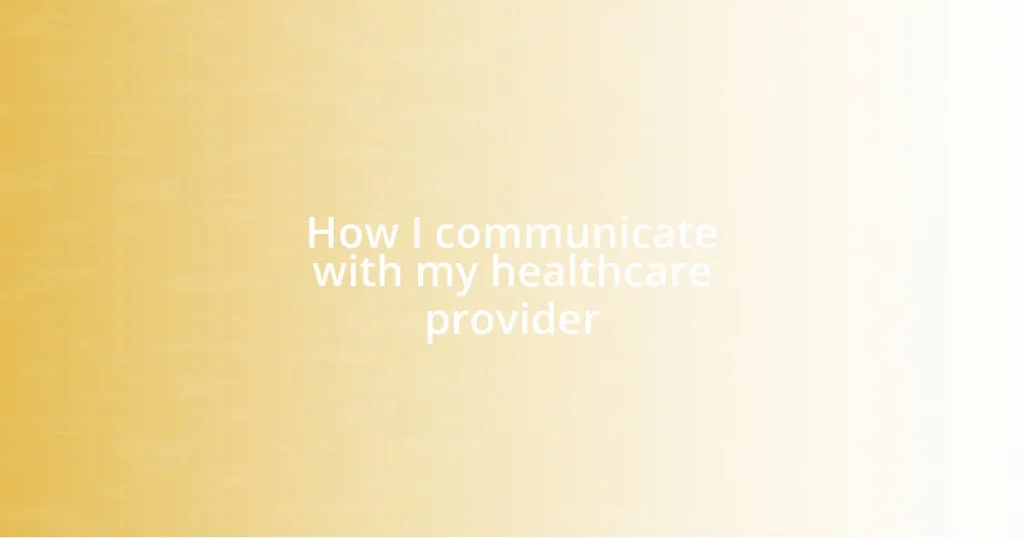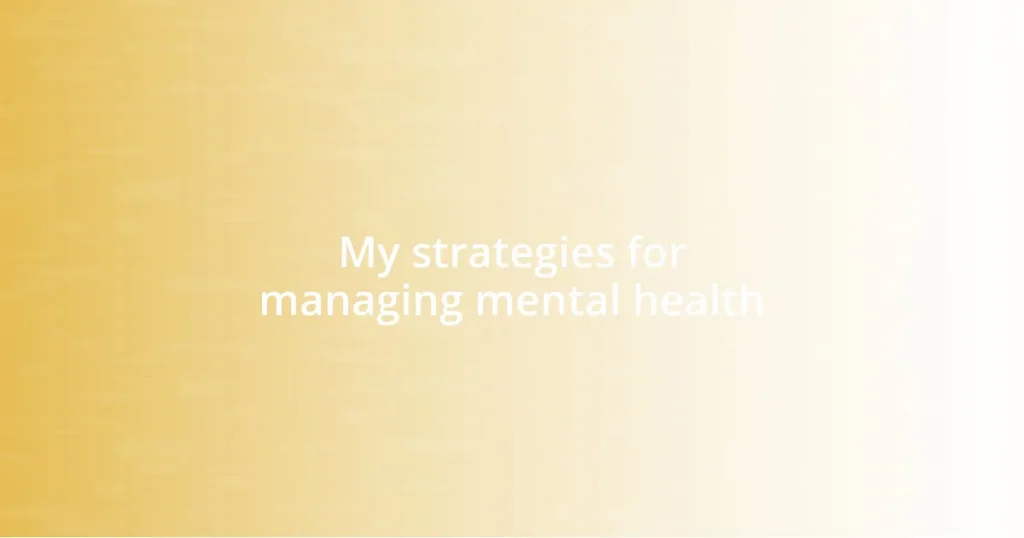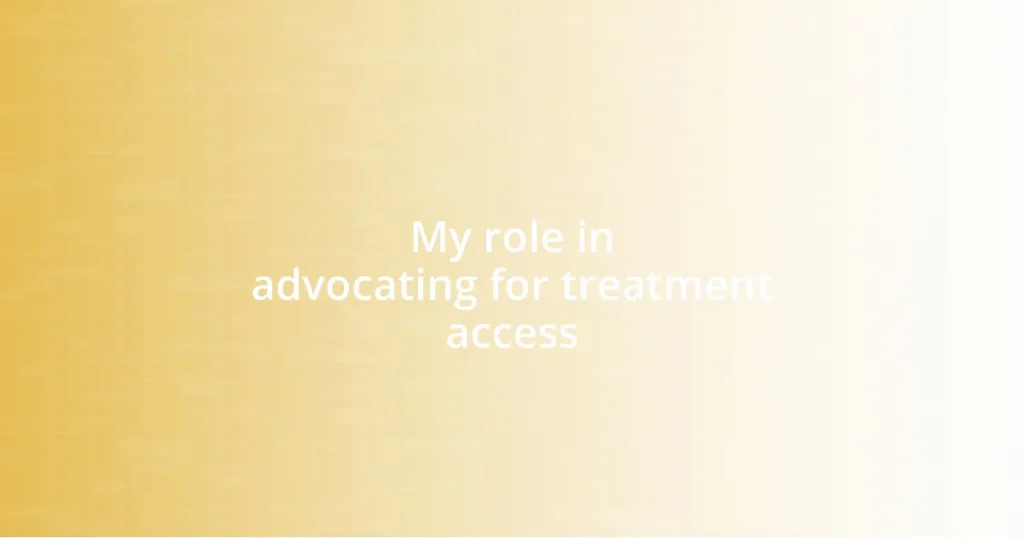Key takeaways:
- Clear communication of healthcare needs, both physical and emotional, enhances patient-provider relationships.
- Choosing a compatible healthcare provider who actively listens fosters effective treatment plans and greater patient engagement.
- Preparation before appointments, such as listing symptoms and questions, empowers patients and leads to productive discussions.
- Following up after appointments not only clarifies uncertainties but also strengthens the ongoing relationship with the provider.
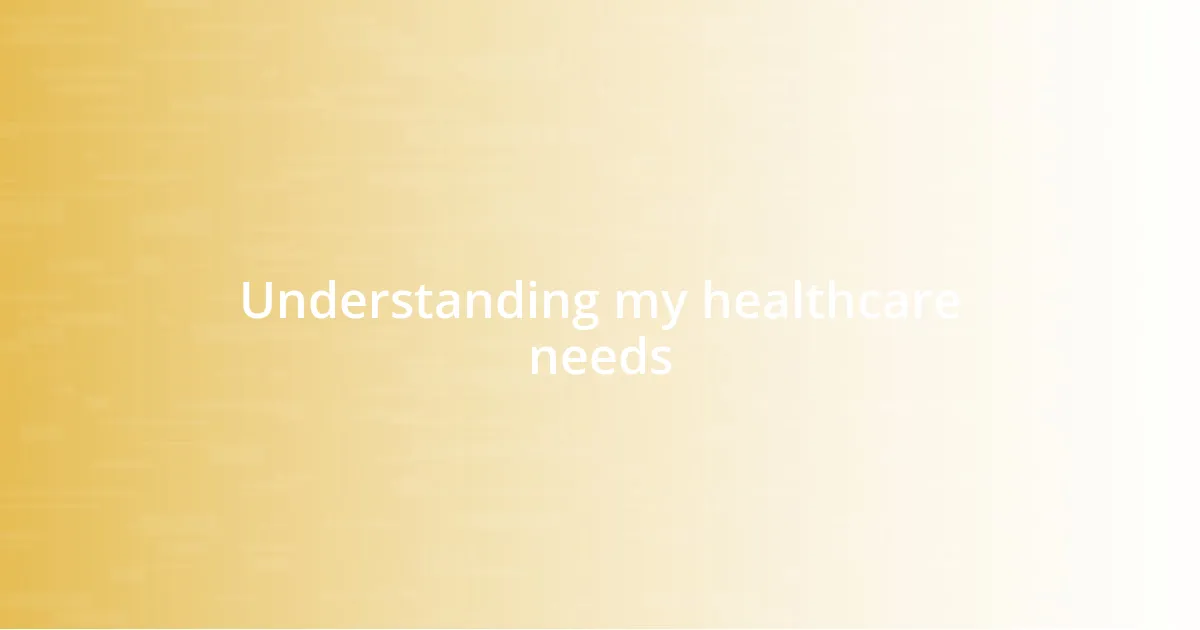
Understanding my healthcare needs
Understanding my healthcare needs often feels like peeling back the layers of an onion. For me, it started with a moment of realization during a check-up when my doctor asked, “What concerns do you have today?” I remember feeling lost—my health felt like a vast sea, and I was barely keeping my head above water. It was then I understood the importance of articulating my needs clearly.
I’ve learned that identifying my healthcare needs requires honesty, both with myself and my provider. One experience that stands out was when I decided to track my symptoms for a month. When I shared this detailed record during my appointment, it sparked a meaningful conversation about my condition. I could see my doctor’s eyes light up, and I felt empowered that I brought something valuable to the table. Isn’t it fascinating how a little preparation can change the dynamic of a visit?
Another key insight for me has been recognizing that my needs are not just physical but emotional as well. When I finally opened up about my anxiety surrounding certain treatments, it felt like a weight lifted off my shoulders. I thought, “Why was I hesitant to share this?” This experience taught me that understanding my healthcare needs isn’t just about the medical facts; it’s about engaging with my whole self.
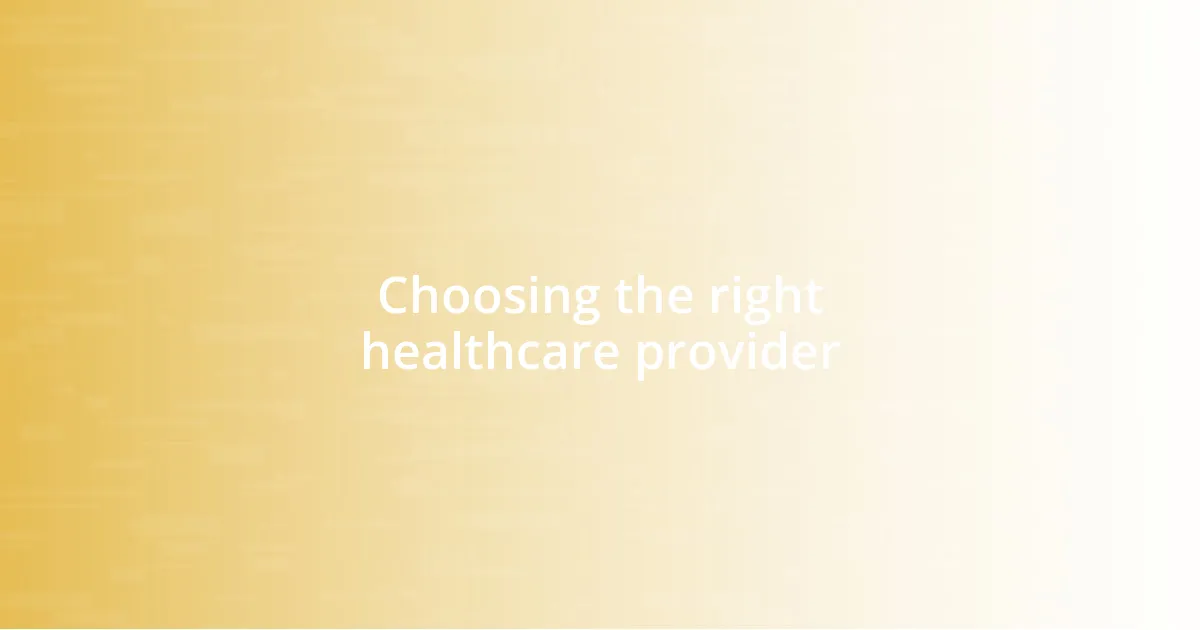
Choosing the right healthcare provider
Choosing the right healthcare provider can feel overwhelming, especially with so many options available. I vividly recall the time I switched doctors; it felt like stepping into a new world. My previous provider simply didn’t listen to my concerns, leaving me frustrated and anxious. But when I found my current healthcare provider, everything changed. The simple act of them nodding in understanding as I spoke made all the difference. It’s crucial to choose someone who actively listens and respects your perspective.
Another important factor is compatibility with your healthcare provider’s approach. Some people thrive with a more traditional, hands-on style, while others prefer a collaborative partnership. I once visited a doctor who pushed treatment options without considering my preferences. It felt disempowering. In contrast, my current provider values my input and invites me to be part of the decision-making process. This mutual respect fosters a stronger bond and leads to a more effective treatment plan.
Lastly, don’t underestimate the power of recommendations and reviews. I rely heavily on what others say when choosing a provider. Friends and family can offer invaluable insights based on their experiences. One time, a friend recommended a specialist who turned out to be a game-changer for my health journey. It’s a reminder that the right provider can significantly impact your overall well-being.
| Factor | My Experience |
|---|---|
| Provider’s Listening Skills | Essential; my current provider actively listens, while my previous one did not. |
| Provider Compatibility | Current provider is collaborative; previous one was not receptive to my input. |
| Recommendations | A friend’s referral led me to a specialist who changed my health outlook. |
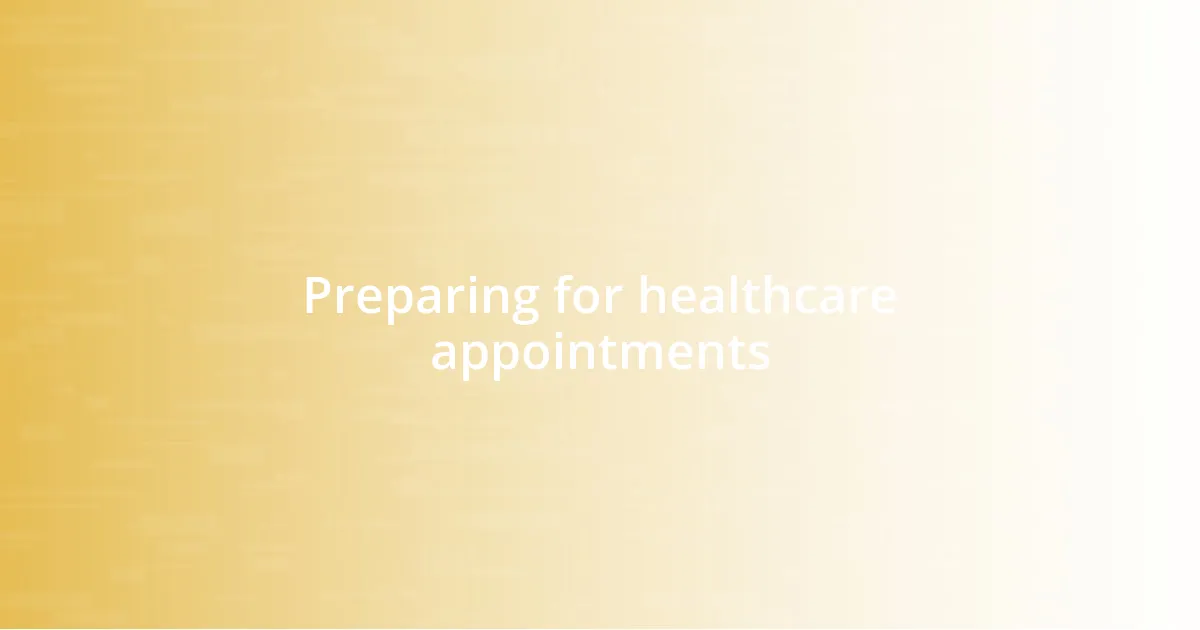
Preparing for healthcare appointments
Getting ready for a healthcare appointment requires more than just showing up. I often set aside some quiet time before the visit to jot down my thoughts and questions. This mental preparation helps me approach the conversation with clarity. I remember one instance when I crafted a list of symptoms and concerns before a check-up. During the appointment, having that list in hand allowed me to articulate my issues effectively, leading to a focused discussion that felt productive.
Here’s how I typically prepare for my appointments:
- Review medical history: I look over my previous visits and any treatments I’ve tried.
- List questions and concerns: I write down what’s been bothering me or what I want to understand better.
- Track symptoms: Keeping a diary of any symptoms helps me provide specific details to my provider.
- Bring a support person: Sometimes, I take a friend or family member to help remember things and offer moral support.
- Practice communication: I rehearse how I want to express my main concerns, reminding myself not to shy away from difficult topics.
When I walk into the appointment fully prepared, it shifts the energy. I feel more in control and empowered to share my experiences. I always encourage others to think of their healthcare provider as a partner. After all, effective communication not only enhances the quality of care but also fosters a sense of trust and understanding between us.
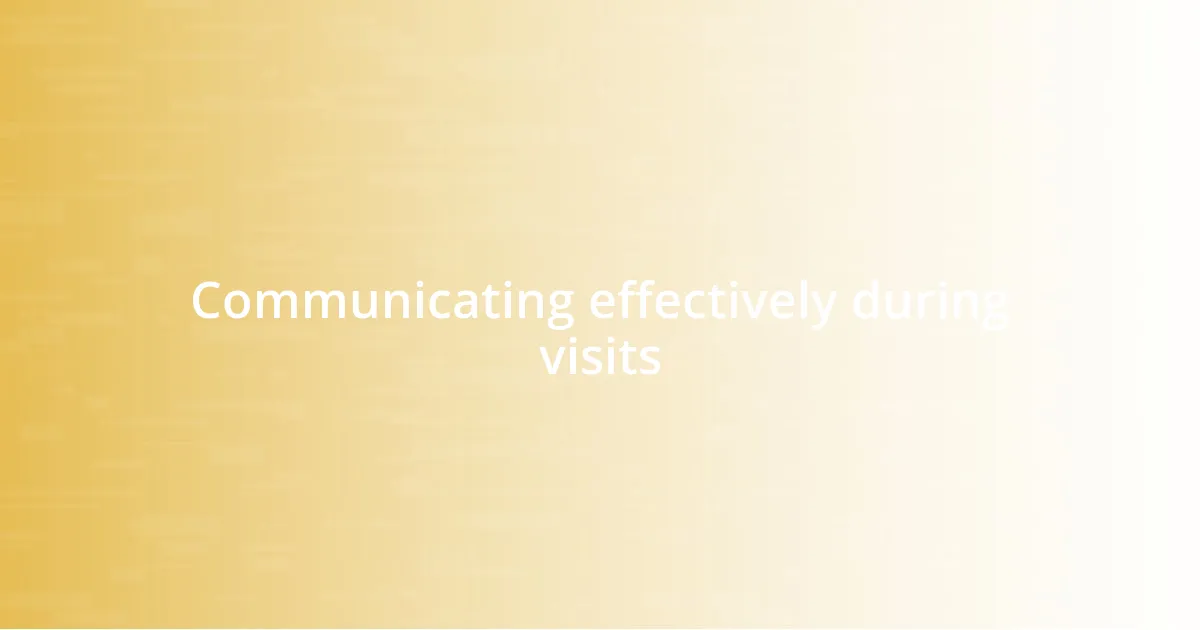
Communicating effectively during visits
Effective communication during healthcare visits is one of the most crucial parts of receiving the right care. I remember a time when I hesitated to voice a concern about a medication side effect because I wasn’t sure how it would be received. When I finally spoke up, my provider appreciated my honesty and adjusted my treatment plan accordingly. This taught me that expressing worries, even if they seem minor, can significantly impact my health outcomes. Have you ever felt nervous about speaking up? It’s a common struggle, but it’s essential to remember that your provider wants the best for you.
Another tactic I’ve found helpful is being clear and specific about my symptoms and concerns. I once visited my doctor with vague descriptions, hoping they would understand what I meant. Instead, the lack of clarity led us down a long, winding path before we pinpointed the issue. Now, I aim to describe my pains and symptoms in detail, sometimes even using descriptive words that evoke imagery. This clarity not only speeds up the diagnosis but also reassures me that we’re on the same page. I always ask myself, “How can I describe this in a way that truly captures what I’m experiencing?” This helps me advocate for my health more effectively.
Lastly, I’ve learned the value of summarizing the discussion at the end of the appointment. After receiving feedback from my provider, I summarize the key takeaways and ask any remaining questions. During one visit, I mistakenly left without fully grasping my treatment plan. It was frustrating because I felt overwhelmed by the information! Now, I make it a point to briefly recap everything before leaving. This habit not only confirms that I understood everything correctly but also builds a stronger connection with my provider, making future visits smoother. I encourage everyone to adopt this practice; it’s an easy yet powerful way to enhance communication.
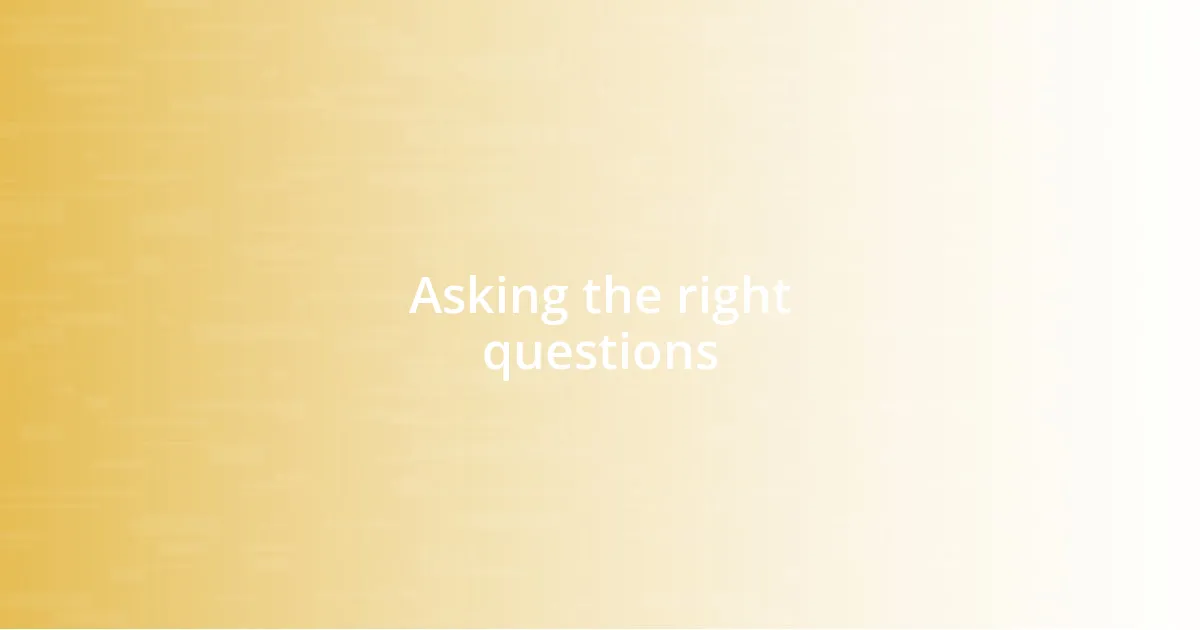
Asking the right questions
Asking the right questions changes everything in a healthcare conversation. I still recall the first time I approached my provider with specific inquiries about a diagnosis. Rather than leaving with more confusion, I walked out with a clearer understanding and a sense of direction. Thinking back, I ask myself, “What if I had just nodded along?” The realization that advocating for myself could lead to a better healthcare experience was empowering.
When I have questions ready, it not only facilitates my understanding but also helps my provider gauge the effectiveness of the information being shared. For instance, I once asked about alternative treatments for a chronic issue I faced. My question opened up a whole new discussion about options I hadn’t even considered. This interaction didn’t just provide me with valuable insights; it fostered a deeper engagement with my provider that felt collaborative and supportive. It makes me wonder—how many more solutions are out there if we just take the initiative to ask?
I also find that the format of my questions matters as much as the content. Instead of asking yes or no questions, I try to frame them in a way that opens up dialogue. I remember asking, “Can you explain how this treatment would work in conjunction with what I’m already doing?” This not only demonstrated my interest but encouraged my provider to elaborate, leading to a richer conversation. Each time I engage like this, I feel a sense of connection, as if we’re both invested in my health journey together. Why not embrace this partnership? It’s one of the most rewarding aspects of navigating healthcare.
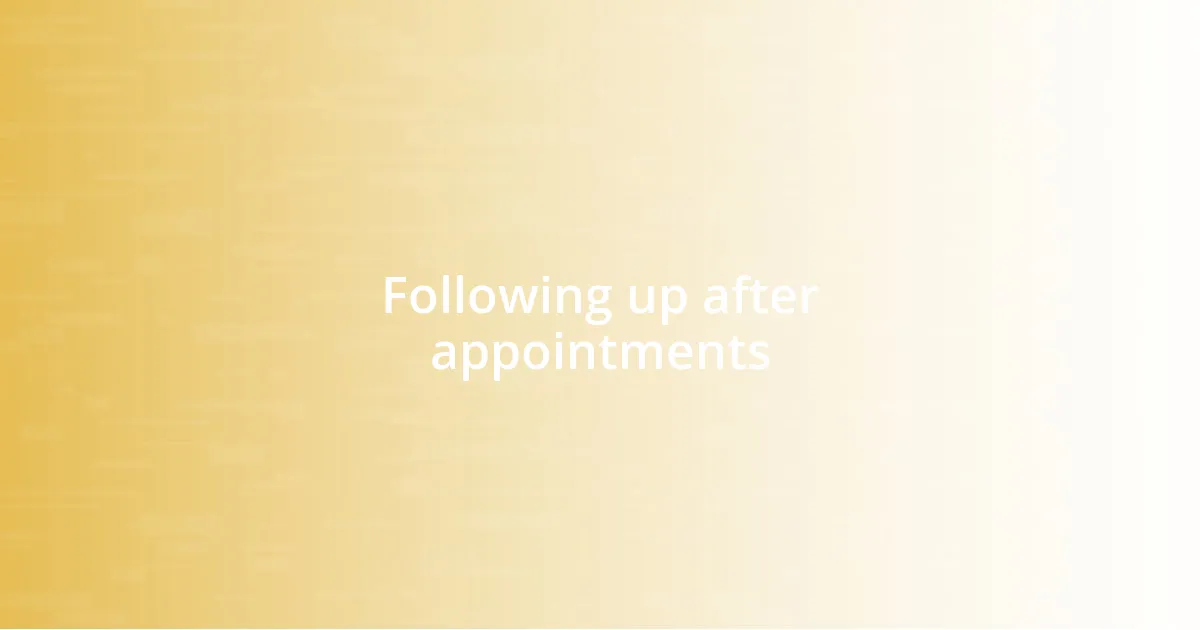
Following up after appointments
After every appointment, I make it a point to follow up with my healthcare provider, especially when I have lingering questions or uncertainties. I recall a time when I left a consultation feeling uneasy about a medication change. A simple email clarifying my doubts not only provided me reassurance but also improved my confidence in the treatment plan. Have you ever felt relief just by reaching out for clarification? It’s amazing how a few sentences can ease anxiety and foster trust.
I also understand the importance of monitoring my symptoms post-appointment. When I notice something unusual following a change in treatment, I jot it down before following up. In one instance, I experienced unexpected side effects that I hadn’t anticipated. By documenting these issues and sharing them with my provider, we were able to tweak my treatment promptly and effectively. This proactive approach ensures that I’m not just a passive recipient of care, but an active participant. Isn’t it empowering to know that your observations can directly influence your health outcomes?
Additionally, I’ve learned that following up isn’t just about addressing problems; it’s an opportunity to reinforce the partnership with my provider. After a recent visit, I took a moment to express my gratitude about their attentiveness and support. It felt good to convey that appreciation, and I believe it helps strengthen our ongoing communication. How often do we take the time to acknowledge the hard work of those caring for us? Sharing positive feedback not only enriches the provider-patient relationship but also encourages open dialogue for future visits. It’s a small gesture with significant impact!
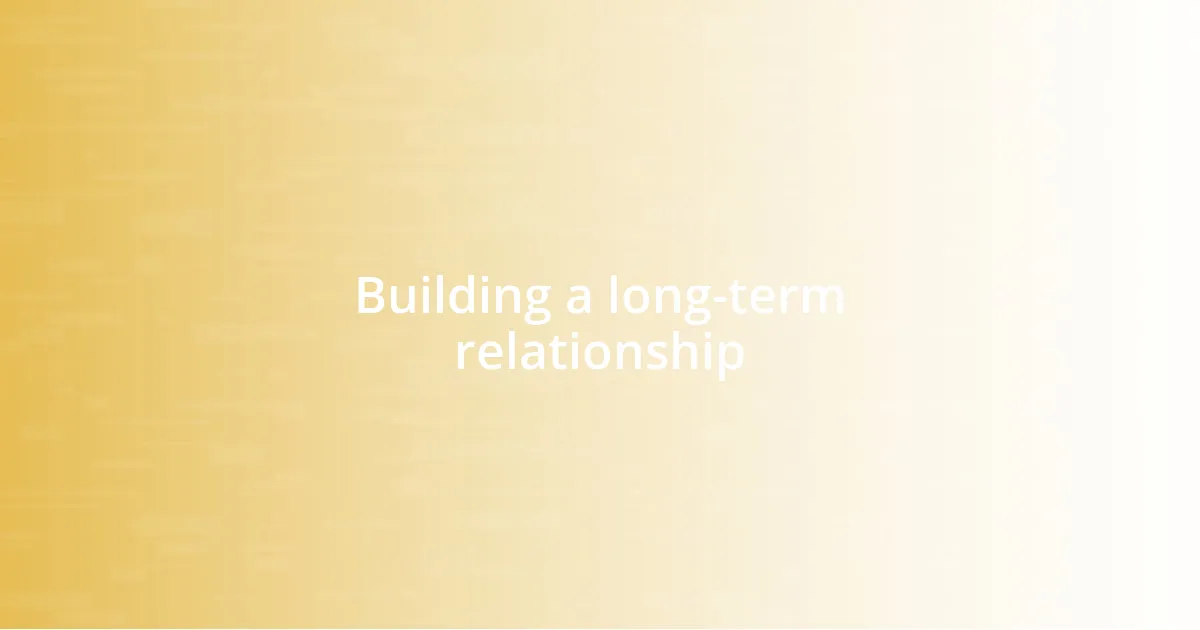
Building a long-term relationship
Building a long-term relationship with my healthcare provider has transformed my approach to wellness. I remember my first visit with my current doctor; it felt like a partnership from the get-go. When I shared my health history openly, they listened intently and even took notes. How often do we come across someone who truly prioritizes understanding us? That initial connection laid a foundation for ongoing communication and trust, making every subsequent appointment feel more like a collaborative effort.
Over time, I discovered how important it is to keep the lines of communication open beyond formal appointments. I often send quick messages about small concerns or updates, which my provider appreciates. Just the other day, I texted them about a minor reaction I had to a new medication. Instead of waiting for my next visit, I received a thoughtful response within hours. It reassured me and reinforced the notion that my healthcare provider genuinely cares about my well-being. Wouldn’t it be great if everyone experienced this level of support?
The emotional aspect of this relationship plays a crucial role as well. I often reflect on how my provider celebrates my milestones, like reducing my blood pressure or reaching a personal fitness goal. When they remember my successes, it feels like I’m part of a team invested in my journey. This creates a sense of accountability for me; I’m not just a patient but someone working alongside them. Have you ever felt that spark of encouragement when someone acknowledges your hard work? It’s those moments that truly strengthen the bond and make maintaining my health feel like a shared journey rather than a solo endeavor.


